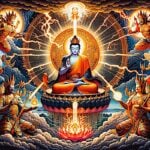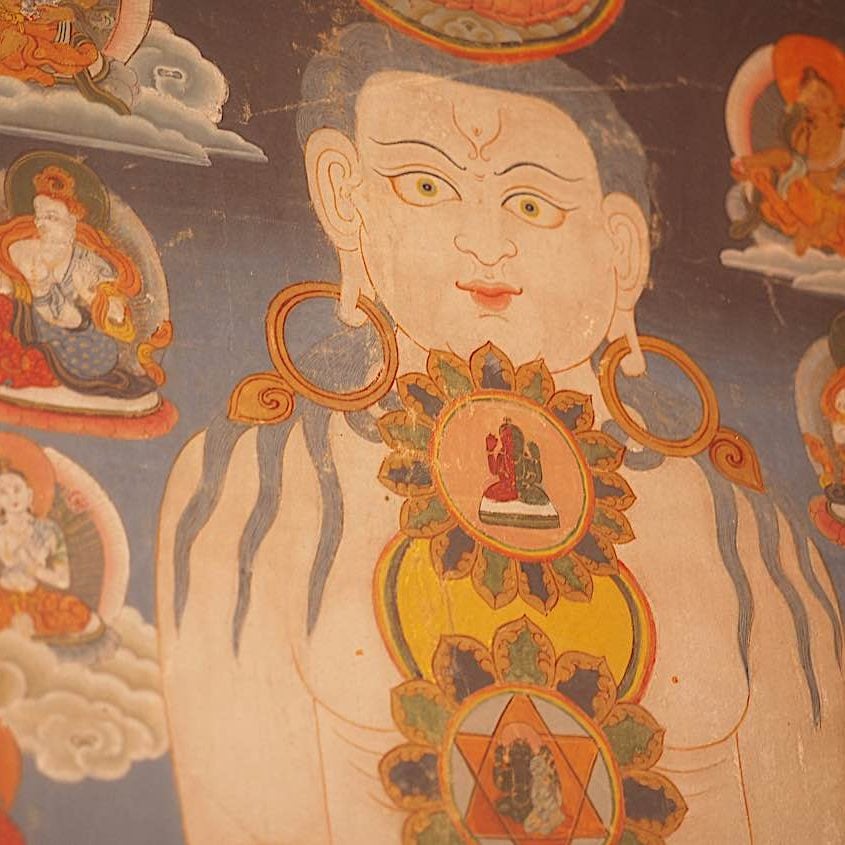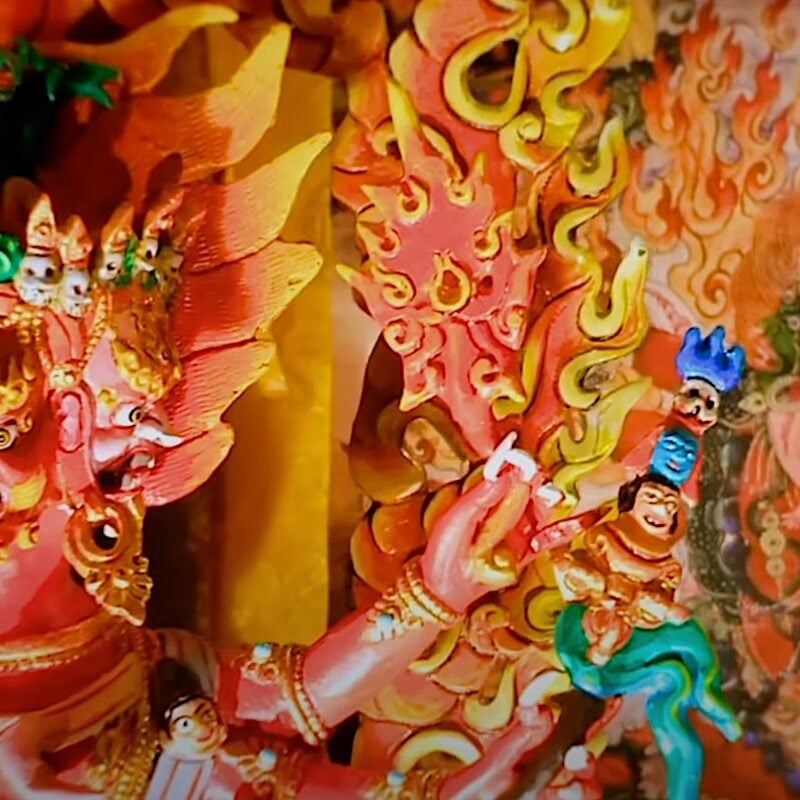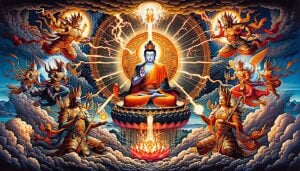Vajrapani, the “Hand of Buddha” defeats the poisons : pride, anger, hate and jealousy
Vajrapani’s name means, literally, “Indestructible Hand” — the Hand of the Buddha. He is one of the three great Bodhisattvas, together with Avalokiteshvara (Chenrezig, Guanyin) and Manjushri, who respectively represent “power of Buddha,” Compassion of Buddha, and Wisdom of Buddha.
He is not only important in Mahayana sutra, but appears in early Pali Sutta — Ambattha Sutta (“Pride Humbled”)[1]— mighty Vajrapani, the Protector of Gotama Buddha Himself, humbled a prideful Brahmin:
“And at that moment Vajrapani holding up a huge iron club, flaming, ablaze and glowing, up in the sky just above Ambattha was thinking, “If this young man does not answer a proper question put to him by the Blessed Lord by the third time of asking, I’ll split his head into seven pieces!” The Lord saw Vajrapani, and so did Ambattha. And at the sight, Ambattha was terrified and unnerved, his hairs stood on end, and he sought protection, shelter, and safety from the Lord. Crouching down close to the Lord.”
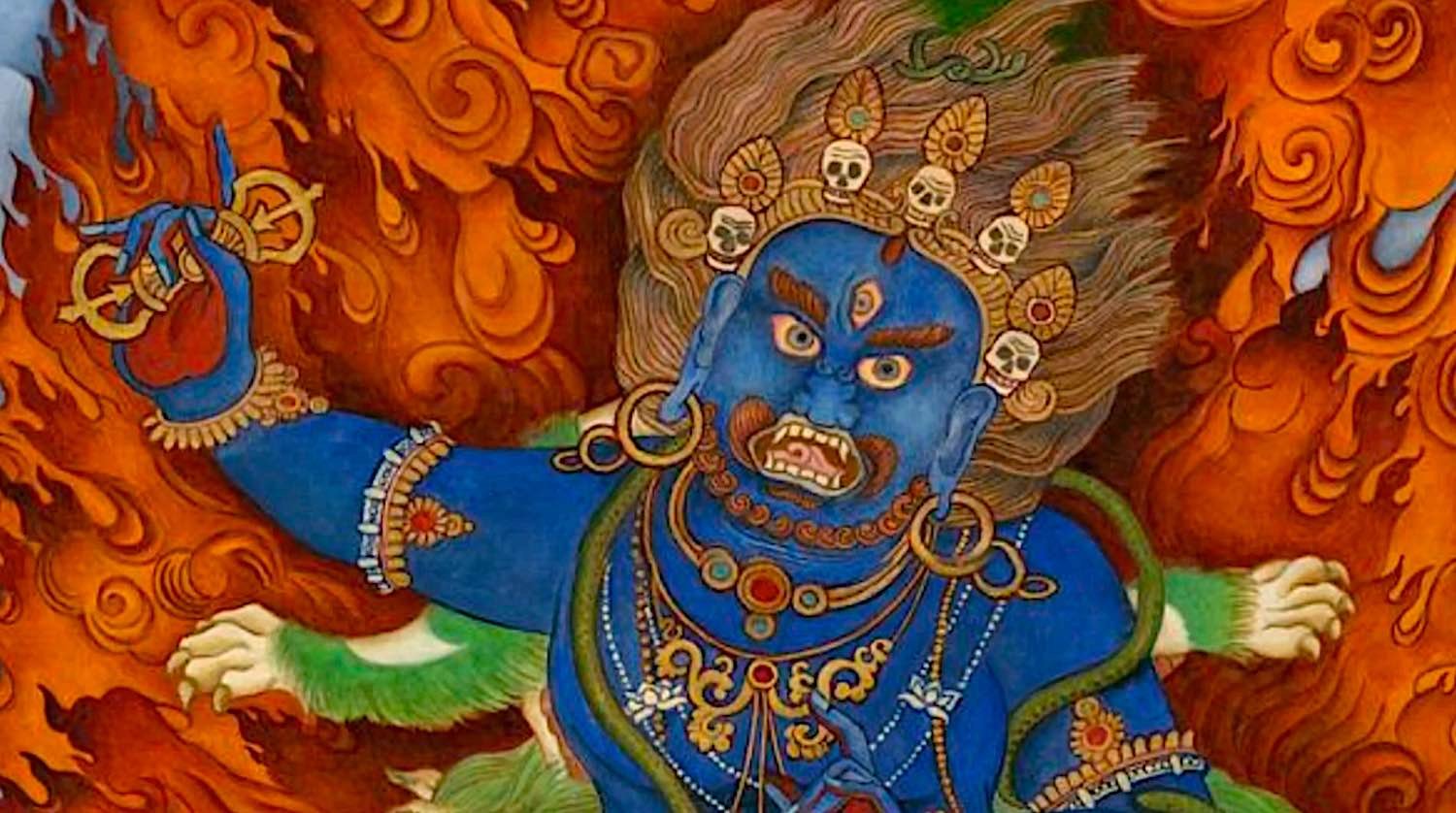
Indestructible Hand of Buddha
This ancient teaching [full Sutta at the end of this feature] predates Mahayana Sutra. In the Mahayana Sutras, Vajrapani becomes even more prominent as the veritable “indestructible hand of the Buddha.” Vajrapani — which can translate as “Indestructible Hand” — is one of the three great Bodhisattvas, each of them representing the three important qualities of Enlightenment:
- Vajrapani is the “indestructible power of the Buddha” — helping us overcome the delusions, poisons and attachments that prevent our progress
- Avalokiteshvara is the “compassion of the Buddha” — helping us overcome ego and clinging, understanding our “Oneness” with all beings
- Manjushri is the “wisdom of the Buddha” — helping us discern truth, and overcome the illusions that keep us trapped.
All three are equals; all are needed on the path to Enlightenment. We must balance compassion, wisdom and the power (i.e. discipline, etc.) to overcome the poisons.
According to the Pañcaviṃsatisāhasrikā- and Aṣṭasāhasrikāprajñāpāramitās, any Bodhisattva on the path can rely on Vajrapani’s protection.
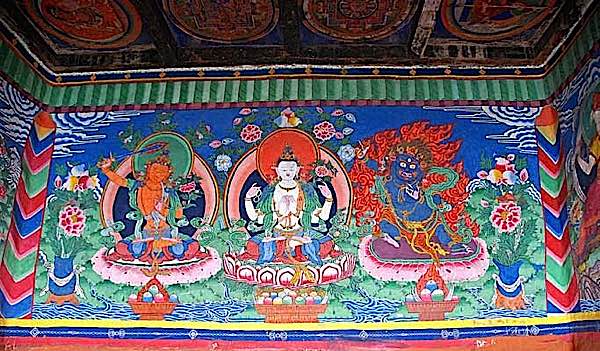
The Hand of the Buddha?
Vajrapani can literally translate as “Vajra Hand” and Vajrapani is likewise considered the “Hand of Buddha” — much like “the Hand of the King” in the Game of Thrones. As the Hand, he symbolizes strength and power of Buddha (Enlightened Mind) to overcome all obstacles. “Vajra” literally translates as “indestructible diamond”, and “Pani” means hand, so one translation of Vajrapani is Indestructible Hand. Another, less interesting translation is “Thunderbolt in hand.” In essence, they mean similar things, since Vajrapani wields this indestructible force in his hand, for the Dharma. I like the Game of Thrones connotations of the former translation.
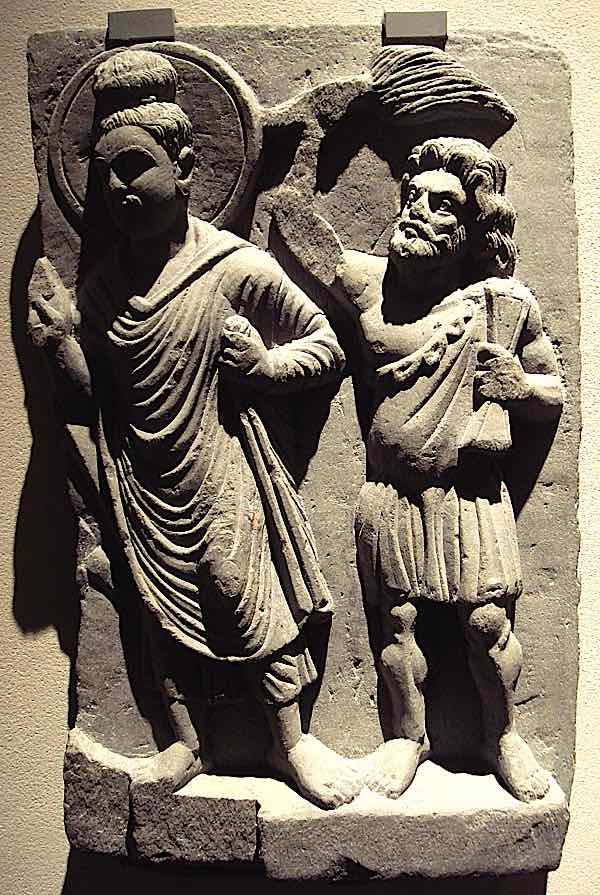
The Lord of Secrets
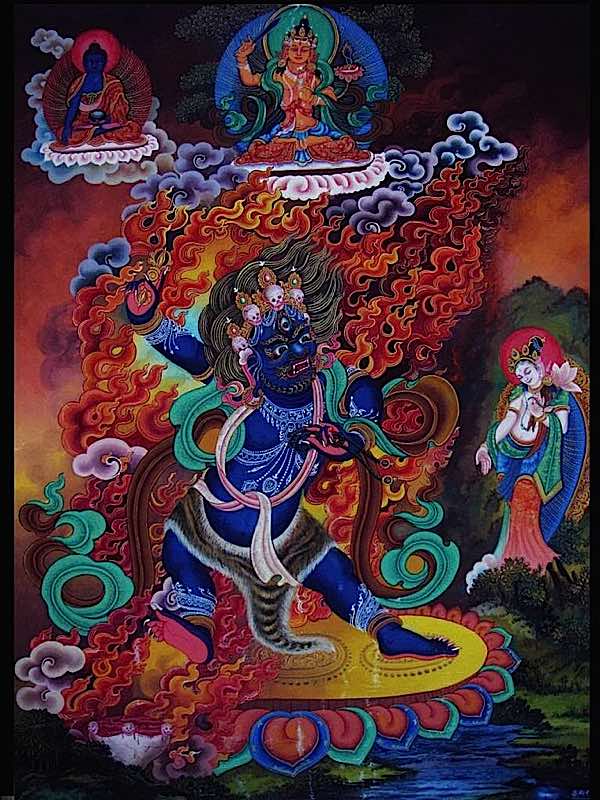
Vajrapani, who belongs the Vajra Family of Akshobhya Buddha, is also often called Guhyapati (“Lord of Secrets”) in the context of Vajrayana, the “secret mantra” path. The secret element is more about “looking inward” and the tantric methods of understanding the true nature of reality — tantric insight into truth — than the idea of keeping esoteric secrets.
It is the insight into truth that makes Vajrapani indestructible, in the same way, it makes Vajrayana the “indestructible vehicle.”
In the Vajravidarana Sutra, Vajrapani’s “inward” nature is explained:
“Condensed within you alone,
Is the power and strength of all the Buddhas.
Manifesting in the wrathful form of the enlightened Vajra,
I pay homage to you Vajra Vidarana, the Subduer.” [2]
“Within you alone” speaks to our own will-power (Vajrapani’s power within us) — that allows us to remove the obstacles to wisdom and compassion. Without that protective power of Vajrapani, it is difficult for ordinary sentient beings to overcome the many obstacles to progress.
Vajrapani manifests in our lives daily (hopefully.) Even that voice in our mind, telling us to get up and meditate — instead of watching television — is Vajrapani at work. (Buddha’s Hand slapping us up the back of the head, metaphorically.) Or, that feeling of guilt when you walk past a homeless person without helping — that’s Vajrapani sternly reminding us to be compassionate. It is Vajrapani who cracks the metaphorical whip in his “hand” (not to beat a metaphor to death) — to keep us working on the foundation practices, to sit each day, or, to practice metta compassion meditation each day. He’s hovering over our head with the “huge iron club, flaming, ablaze and glowing.”
Vajrapani — indestructible and undefeatable
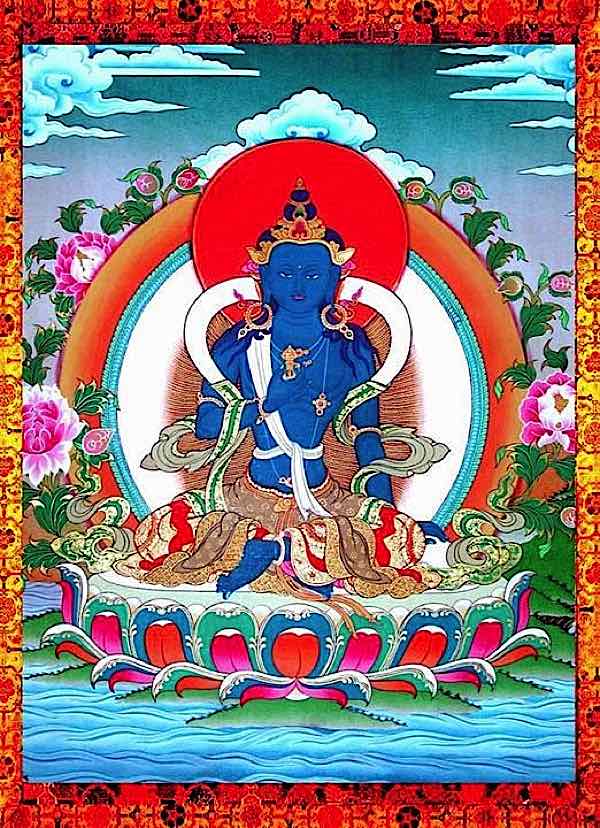
It is a hopeful thought, to know that within us is Vajrapani, indestructible and undefeatable. It is the nature of Vajra to be indestructible — that’s one of the definitions of vajra.
Like Vajrasattva, his main attribute is the vajra — both an attribute of his name and one he symbolically holds. The vajra is the most staggeringly powerful instrument of the “deities”, whether you view them as symbolic or real. [For a story on vajra (dorje) and bell see >>]
It is the “weapon” of Indra, the thunderbolt, similar to Zeus’s bolt and Thor’s hammer. In myth, Thor could control even the great beast Jormungandr. Zeus could destroy any being, including a god, with his bolts. In classical 2nd century Gandhara art, influenced by the Greeks, Vajrapani is depicted as Zeus. (At the time, Alexander the Great’s Greek Empire touched northern India, influencing art and culture in the area.)
Vajrapani a protector, not a bully
It is Vajrapani power that strips away our pride — as he did for the Brahmin in the Pali Sutta Ambattha. It is Vajrapani that embodies the power needed to overcome all the afflictive emotions. It is Vajrapani that gives us the will to progress even against the heavy weight of our vast harmful past karmas (past damaging deeds.) It is Vajrapani that symbolizes the discipline needed to practice each day.
It may seem that Vajrapani is a bully — the way he threatened the Brahmin, helping him overcome his pride — but it requires the strength of a protector, angry fierce power, to give us the discipline to overcome pride, greed, anger, hate and all the poisons. For this reason, millions of people around the world chant the peaceful mantra of Vajrapani every day — together with the other great Bodhisattvas. Even the peaceful form of Vajrapani is indestructibly irresistible.
Contrary to the classic bully, Vajrapani transforms our fear and feelings of being powerless into action and strength. He is, instead, the strong friend at school who teaches us to kung-fu the bully.
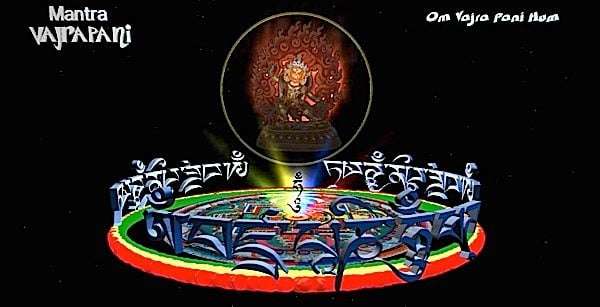
Vajrapani mantra — chant daily to remove negative energy
Despite his power, Vajrapani is a Bodhisattva and has a peaceful aspect that anyone may appreciate, meditate on or practice. The mantra is a recommended daily chant, with or without any empowerment. Especially when faced with obstacles, many teachers instruct their students to recite Vajrapani’s mantra.
Many Buddhist students, for life, will chant the Mantras of the Three Great Bodhisattvas — as a way to keep strength, compassion and wisdom present in our present moment. The Three Bodhisattvas, of course, are: Vajrapani, Avalokiteshvara and Manjushri:
- Vajrapani: Om Vajrapani Hum (In Tibetan “Om Benza Pani Hung”)
- Avalokiteshvara: Om Mani Padme Hum (In Tibetan “Om Mani Peme Hung”)
- Oṃ A Ra Pa Tza Na Dhīḥ (Tza is generally pronounced “cha” and when transliterated from Sanskrit is written “ca”.)
Video: various versions of the Vajrapani Chant with deity and mantra jewel mandala visualization:
Merits of the Mantra of Vajrapani
“Then said the Buddha, “You have been blessed as both Bodhisattva and Wrathful Deity by all the Buddhas in the past. The Buddhas to come will also bless you in both of these two forms. Now, I shall also bless you. You shall become the master of all the great devas. You should amancipate all sentient beings from Samsara and from miseries.”[3]

The mantra of Vajrapani is a very straight-forward one, easy, yet powerful: Om Vajrapani Hum. Om symbolizes many things, including the Five Buddhas the Five Wisdoms. Vajrapani (Thunderbolt holder, diamond-scepter holder, or Vajra Hand) is homage to the great Vajrapani. HUM is the word that “Destroys all suffering.”
According to the Tantra of the Supreme Origination of Vajrapani.[3]:
” If the disciple renders one obeisance to Vajrapani, he attains more merits than he would have secured through rendering numerous obeisances to myriads of Buddhas as many as the total grains of sands in ninety-two million Ganges Rivers… If he relies on Vajrapani as his Yidam Buddha and recites the Mantra, he will surely be protected by Vajrapani from all hindrances. No demons can hurt him, all illness will be cured, his merits will be increased and prosperity augmented. All his wishes will be fulfilled. Thus, the benefits of practicing this ritual are beyond description, nothing can afflict those who practice it. The practitioner of this ritual will also accomplish all the four activities — Pacifying, Enriching, Magnetizing and Wrathful. He will encounter no obstacles. Therefore, one should always rely on Vajrapani, take him as one’s shelter and refuge. Also, those who have chronic diseases will be cured through reciting the Mantra of Vajrapani.”
The peaceful aspect of Vajrapani — which is already fiery and plenty powerful — is an easy mantra to chant:
Om Vajrapani Hum
or Tibetan Pronunciation
Om Benza Pani Hung
ཨོཾ་བཛྲ་པཱ་ཎི་ཧཱུྂ༔
Deep throat singing version of Vajrapani’s mantra by Lama Tashi:
Wrathful Vajrapani: unbridled power
Unbridled is probably the wrong word, but the sense of overwhelming power defines the even more wrathful forms of Vajrapani, standing in an ocean of flames, hair standing on end, face transformed by wild fury.
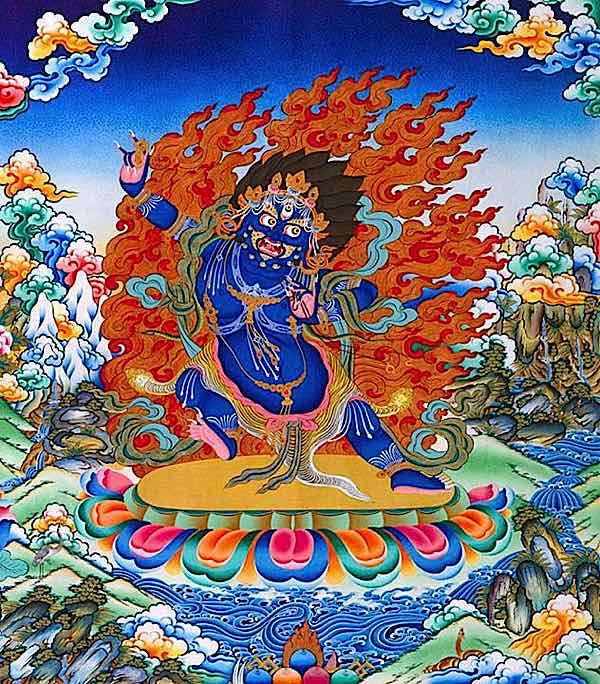
Wrathful Vajrapani are normally permission-based practices, due to their boundless power. Empowerment and teaching-guidance is needed to practice these forms. Wrathful practices are important in senior practice, as they are transformative. They ferocious style of meditation is aimed at transforming anger, hate and strong emotions into Enlightened characteristics. [For a detailed story on Wrathful deities, see>>]
Since Vajrapani is already indestructible, for most of us the more peaceful forms are all we’ll need to empower our lives, slap us up the back of the head when we are lazy and keep us on track.
In peaceful form, he is a noble warrior, ready to be our Hand of Protection and strength. In his wrathful form, no obstacle can stand.
From Tantra: Thunderbolt-Holder
From the Tantra of One-Hundred-and-Eight Praisings:
“The numerous Buddhas and Bodhisattvas were much pleased. Thereupon they blessed Vajrapani and named him the Thunderbolt-Holder, the Master of the Cosmos, and handed him the thunderbolt as the symbol of initiation. Then Vajrapani said to the Buddha, “O my Lord Bhaghavan! I am the protector of all Buddhas in the three times; I was the protector of the seven Buddhas in the past; I am the protector of the present Buddha and will be the protector of the nine-hundred-and-ninety-two Buddhas in the future. I shall be their protectors until all of the one thousand Buddhas in this Kalpa have completed their missions. I shall protect them from all hindrances. I have besought the Buddhas in the past to preach the Dharma, and shall beseech the Buddhas in the future to preach the Dharma; also I shall beseech all the present Buddhas to preach the Dharma. I pray you, the Perfect One, grant me your blessings.”
Vajrapani universal to nearly all Buddhist traditions
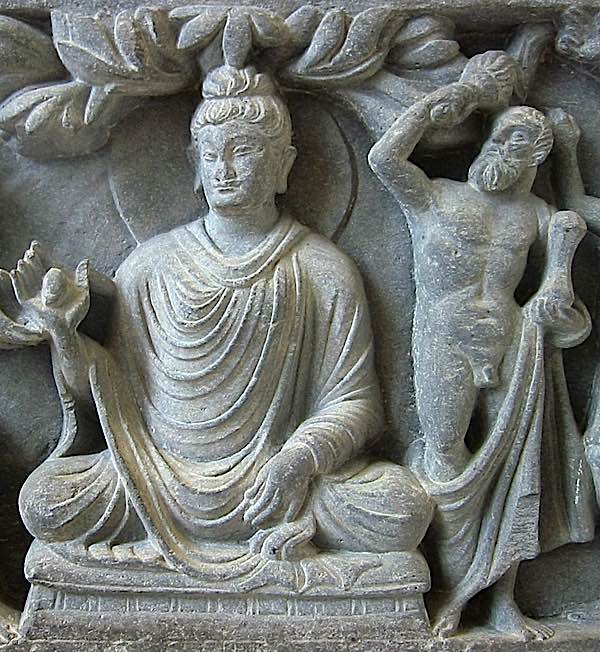
Vajrapani is honored in early Pali Sutta as the “Protector of Buddha.” In Mahayana Sutra, he is one of the three great Bodhisattvas. In Vajrayana, Vajrapani is all of those, but also a fully Enlightened Buddha, a Protector, and a Yidam (Meditational Deity.)
Vajrapani is revered in all Buddhist countries — emphasized to different degrees — but universal:
- In the West (Vajrayana): he is practiced variously as a Bodhisattva, Buddha, or Yidamk, depending on tradition.
- In Cambodia: he is one of the three main deities of three monasteries (dating to 953 AD) who honour Buddha, Prajnaparamita, and Vajrapani.
- In India: in the early period, Vajrapnai was mostly a protector of Shakyamuni, not yet thought of as a Bodhisattva, but already the Hand of the Buddha.
- In Nepal, he takes different forms, and is an important deity.
- In Tibet, Vajrapani has vast significance. He can appear peaceful and wrathful, in many forms. He can be Enlightened Buddha, Bodhisattva and Protector all at the same time. Although there are many protectors in Tibetan Buddhism, Vajrapani is synonymous with power.
- In Japan, He is known as Shukongoshin (the “head vajra-wielding god”).
- In Gandhara (Central Asia) , he is fused somewhat with Herakles (Roman Hercules) due to Greek influence after Alexander the Great’s invasion. He is associated also with Indra (and Zeus by the Greeks.)
Full Ambattha Sutta follows.
Ambattha Sutta
Pride Humbled
Thus have I heard. Once the lord was touring Kosala with a large number of monks, some five hundred, and he came to a Kosalan Brahmin village called Icchanankala. And he stayed in the dense jungle of Icchanankala. At that time the Brahmin Pokkharasati was living at Ukkhattha, a populous place, full of grass, timber, water and corn, which had been given to him by king Pasenadi of Kosala as a royal gift with royal powers.
And Pokkharasati heard say, “The ascetic Gotama, son of the Sakyans, who has gone forth from the Sakyan clan, is staying in the dense jungle of Icchanankala. And concerning that Blessed Lord a good report has been spread about, ‘This Blessed Lord is an Arahant, a fully enlightened Buddha, perfected in knowledge and conduct, a well-farer, knower of the worlds, unequalled trainer of men to be tamed, teacher of gods and humans, a Buddha, a Blessed Lord.’ He proclaims this world with its gods, Maras, Brahmas, the world of ascetics and Brahmins with its princes and people, having come to know it by his own knowledge. He teaches a Dhamma that is ending, in the spirit and in the letter, and he displays the fully perfected, thoroughly purified holy life. And indeed it is good to see such Arahants.”
Now, at that time Pokkharasati had a pupil, the youth Ambattha, who was a student of the Vedas, who knew the mantras, perfected in the Three Vedas, a skilled expounder of the rules and rituals, the lore of sounds and meanings and, fifthly, oral tradition, complete in philosophy and the marks of a great man, admitted and accepted by his master in the Three Vedas with the words, “What I know, you know; what you know, I know.”
And Pokkharasati said to Ambattha, “Ambattha, my son, the ascetic Gotama, son of the Sakyans, who has gone forth from the Sakyan clan, is staying in the dense jungle of Icchanankala. And concerning that Blessed Lord a good report has been spread about, , “This Blessed Lord is an Arahant, a fully enlightened Buddha, perfected in knowledge and conduct, a well-farer, knower of the worlds, unequalled trainer of men to be tamed, teacher of gods and humans, a Buddha, a Blessed Lord.’ Now you go to see the ascetic Gotama and find out whether this report is correct or not, and whether the Reverend Gotama is as they say or not. In that way we shall put the Reverend Gotama to the test.”
“Sir, how shall I find out whether the report is true, or whether the Reverend Gotama is as they say or not?”
“According to the tradition of our Mantras, Ambattha, the great man who is possessed of the thirty two marks of a great man has only two courses open to him. If he lives the household life he will become a ruler, a wheel-turning righteous monarch of the law, conqueror of the four quarters, who has established the security of his realm and is possessed of the seven treasures. These are, The Wheel Treasure, the Elephant Treasure, the Horse Treasure, the Jewel Treasure, the Woman Treasure, the Householder Treasure, and, as a seventh, the Counselor Treasure. He has more than a thousand sons who are heroes, of heroic stature, conquerors of the hostile army. He dwells having conquered the sea-girt land without a stick or sword, by the law. But if he goes forth from the household life into homelessness, then he will become an Arahant, a fully enlightened Buddha, one who draws back the view from the world. And, Ambattha, I am the passer-on of the Mantras, and you are the receiver.”
“Very good, sir” said Ambattha at Pokkharasati’s words, and he got up, passed by Pokkharasati with his right side, got into his chariot drawn by a mare and, accompanied by a number of young me, headed for the dense jungle of Icchanankala. He drove as far as the carriage would go, then alighted and continued on foot.
At that time a number of monks were walking up and down in the open air. Ambattha approached them and said, “Where is the Reverend Gotama to be found just now? We have come to see the Reverend Gotama.”
The monks considered Ambattha and thought, “This is Ambattha, a youth of good family and a pupil of the distinguished Brahmin Pokkharasati. The Lord would not mind having a conversation with such a young man.” And they said to Ambattha,
“That is his dwelling, with the door closed. Go quietly up to it, go on to the veranda without haste, cough, and knock on the bolt. The Lord will open the door to you.”
Ambattha went up to the dwelling and onto the veranda, coughed, and knocked. The Lord opened the door, and Ambattha went it. The young men entered, exchanged courtesies with the Lord, and sat down to one side. But Ambattha walked up and down while the Lord sat there, uttered some vague words of politeness, and then stood so speaking before the seated lord.
And the Lord said to Ambattha, “Well now, Ambattha, would you behave like this if you were talking to venerable and learned Brahmins, teachers of teachers, as you do with me, walking and standing while I am sitting, and uttering vague words of politeness?”
“No, Reverend Gotama. A Brahmin should walk with a walking Brahmin, stand with a standing Brahmin, sit with a sitting Brahmin, sit with a sitting Brahmin, and lie down with a Brahmin who is lying down. But as for those shaven little ascetics, menials, black scourings from Brahmas foot, with them it is fitting to speak just as I do with the Reverend Gotama.”
“But, Ambattha, you came here seeking something. Whatever it was you came for, you should listen attentively to hear about it. Ambattha, you have not perfected your training. Your conceit of being trained is due to nothing but inexperience.”
But Ambattha was angry and displeased at being called untrained, and he turned on the Lord with curses and insults. Thinking, “The ascetic Gotama bears me ill-will” he said, “Reverend Gotama, the Sakyans are fierce, rough spoken, touchy and violent. Being of menial origin, being menials, they do not honor, respect, esteem, revere or pay homage to Brahmins. With regard to this it is not proper that they [behave in such a manner and] do not pay homage to Brahmins. [He is complaining that they do not honor the rigid “caste system” of India. –BIONA webmaster] This was the first time Ambattha accused the Sakyans of being menials.
“But, Ambattha, what have the Sakyans done to you?”
“Reverend Gotama, once I went to Kapilavatthu on some business for my teacher, the Brahmin Pokkharasati, and I cam to the Sakyans meeting hall. And at that time a lot of Sakyans were sitting on high seats in their meeting hall, poking each other with their fingers, laughing and playing about together, and it seemed to me that they were just making fun of me, and no offered me a seat. With regard to this, it is not proper that they do not pay homage to the Brahmins.” This was the second time Ambattha accused the Sakyans of being menials.
“But, Ambattha, even the quail, that little bird, can talk as she likes in her own nest. Kapilavatthu is the Sakyans home, Ambattha. They do not deserve censure for such a trifle.”
“Reverend Gotama, there are four castes: The Khattiyas, the Brahmins, the merchants and the artisans. And of these four castes, three – the Khattiyas, the merchants, and the artisans – are entirely subservient to the Brahmins.” This was the third time Ambattha accused the Sakyans of being menials.
Then the Lord thought, “This young man goes too far is abusing the Sakyans. Suppose I were to ask after his clan name?” So he said, “Ambattha, what is your clan?”
“I am a Kanhayan, Reverend Gotama.”
“Ambattha, in former days, according to those who remember the ancestral lineage, the Sakyans were the masters, and you are descended from a slave girl of the Sakyans. For the Sakyans regard to king Okkaka, to whom his queen was dear and beloved, wishing to transfer the kingdom to her son, banished his elder brothers from the kingdom – Okkamukha, Karandu, Hatthiniya, and Sinipura. And these, being banished, made their home on the flank of the Himalayas beside a lotus pond where there was a growth of teak-trees. And for fear of contaminating their stock they cohabitated with their own sisters. Then King Okkaha asked his ministers and counselors, “Where are the princes living now?” And they told him. At this, King Okkaha exclaimed, “They are strong as Saka trees, these princes, they are real Sakyans!” And this how the Sakyans go their well-known name. And the king was the ancestor of the Sakyans.
“Now King Okkaha has a slave girl called Disa, who gave birth to a Kanha [dirty, black] child. The black thing, when it was born, exclaimed, “Wash me, mother! Bath me, mother! Deliver me from this dirt and I will bring you profit!” Because, Ambattha, just as people today use the term hobgoblin as a term of abuse, so in those days did they say Kanha. And they said, “As soon as he was born, he spoke! He is born a Kanha, a hobgoblin!” That is how, in former days according to those who remember the ancestral lineage, the Sakyans were the masters, and you are descended from a slave girl of the Sakyans.”
On hearing this, the young men said, “Reverend Gotama, do not humiliate Ambattha too much with talk of his being descended from a slave girl: Ambattha is well born, of a good family, he is very learned, he is well-spoken, a scholar, well able to hold his own in this discussion with the Reverend Gotama!”
Then the Lord said to the young men, “If you consider that Ambattha is ill-born, not of good family, unlearned, ill-spoke, unable to hold his own in this discussion with the ascetic Gotama, then let Ambattha be silent, and you conduct this discussion with me. But if you think he is well born, of a good family, he is very learned, he is well-spoken, a scholar, able to hold his own, then you be quiet and let him discuss with me.”
“Ambattha is well born, Reverend Gotama, of a good family, he is very learned, he is well-spoken, a scholar, able to hold his own. We shall be silent, he shall continue.”
Then the Lord said to Ambattha, “Ambattha, I have a fundamental question for you, which you will not like to answer. If you don’t answer, or if you evade the issue, if you keep silent or go away, your head will split into seven pieces. What do you think, Ambattha? Have you heard from old and venerable Brahmins, teachers of teachers, where the Kanhayans came from, or who was their ancestor?”
At this, Ambattha remained silent, and the lord said,
“Answer me now, Ambattha, this is not the time for silence. Whoever, Ambattha, does not answer a fundamental question put to him by a Tathágata by the third asking has his head split into seven pieces.”
And at that moment Vajrapani the Yaksha, holding up a huge iron club, flaming, ablaze and glowing, up in the sky just above Ambattha was thinking, “If this young man does not answer a proper question put to him by the Blessed Lord by the third time of asking, I’ll split his head into seven pieces!” The Lord saw Vajrapani, and so did Ambattha. And at the sight, Ambattha was terrified and unnerved, his hairs stood on end, and he sought protection, shelter, and safety from the Lord. Crouching down close to the Lord, he said, “What did the Reverend Gotama say? May the Reverend Gotama repeat what he said!”
“What do you think, Ambattha? Have you heard from old and venerable Brahmins, teachers of teachers, where the Kanhayans came from, or who was their ancestor?”
“Yes, I have heard it just as the Reverend Gotama said, that is where the Kanhayans came from, he was their ancestor”
Hearing this, the young men made a loud noise and clamor, “So Ambattha is ill-born, not of a good family, born of a slave girl of the Sakyans, and the Sakyans are Ambattha’s masters! We disparages the Ascetic Gotama, thinking he was not speaking the truth!”
Then the Lord thought, “It is too much, the way these young men humiliate Ambattha for being the ancestor of a slave girl. I must get him out of this.” So he said to the young men, “Don’t disparage Ambattha too much for being the ancestor of a slave girl! That Kahna was a mighty sage [Known more commonly today as Krishna –BIONA Webmaster.] He went to the south country, learnt the mantras of the Brahmins there, and then went to King Okkaka and asked for his daughter Maddarupi. And Okkaka, furiously angry, exclaimed, “So this fellow, the son of a slave girl, wants my daughter!” And put an arrow to his bow. But he unable either to shoot to arrow or to withdraw it. Then the ministers and the counselors came together to the Sage Kanha and said, “Spare the King, Reverend Sir, spare the king!”
“The king will be safe, but if he looses the arrow downwards, the earth will quake as far as his kingdom extends.”
“Reverend Sir, Spare the king, spare the land!”
“The king and the land will be safe, but if he looses the arrow upwards, as for as his realm extends the god will not let it rain for seven years.
“Reverend Sir, spare the king, Spare the land, and may the god let it rain!”
“The king and the land will be safe, and the god will let it rain, but if the king points the arrow at the crown prince, the prince will be completely safe.”
“Then the Ministers exclaimed, “Let King Okkaka point the arrow at the crown prince, the prince will be perfectly safe!” The king did so and the prince was unharmed. Then king Okkaka, terrified and fearful of divine punishment gave away his daughter to Maddarupi. So, young men, do not disparage Ambattha too much for being the ancestor of a slave girl. That Kahna was a mighty sage.”
Then the lord said, “Ambattha, what do you think? Suppose a Khattiya youth were to wed a Brahmin maiden, and there was a son of the union. Would that son of a Khattiya youth and a Brahmin maiden receive a seat and water from the Brahmins?”
“He would, Reverend Gotama.”
“Would they allow him to eat at funeral-rites, at rice-offerings, at sacrifices, or as a guest?”
“They would, Reverend Gotama.”
“Would they teach him mantras or not?”
“They would, Reverend Gotama.”
“Would they keep their women covered or uncovered?”
“Uncovered, Reverend Gotama.”
“But would the Khattiyas sprinkle him with the Khattiya consencration?”
“No, Reverend Gotama.”
“Why not?”
“Because, Reverend Gotama, he is not well born on his mothers side.”
“What do you think, Ambattha? Suppose a Brahmin youth were to wed a Khattiya maiden, and there was a son of the union. Would that son of a Khattiya youth and a Brahmin maiden receive a seat and water from the Brahmins?”
“He would, Reverend Gotama.”
“He would, Reverend Gotama.”
“Would they allow him to eat at funeral-rites, at rice-offerings, at sacrifices, or as a guest?”
“They would, Reverend Gotama.”
“Would they teach him mantras or not?”
“They would, Reverend Gotama.”
“Would they keep their women covered or uncovered?”
“Uncovered, Reverend Gotama.”
“But would the Khattiyas sprinkle him with the Khattiya consecration?”
“No, Reverend Gotama.”
“Why not?”
“Because, Reverend Gotama, he is not well born on his fathers side.”
“So, Ambattha, the Khattiyas, through a man taking a woman or a woman taking a man, are senior to the Brahmins. What do you think, Ambattha? Take the case of a Brahmin who, for some reason, has had his head shaved by the Brahmins, has been punished with a bag of ashes and banished from the country or the city. Would he receive a seat and water from the Brahmins?”
“No, Reverend Gotama.”
“Would they allow him to eat at funeral-rites, at rice-offerings, at sacrifices, or as a guest?”
“No, Reverend Gotama.”
“Would they teach him mantras, or not?”
“They would not, Reverend Gotama.”
“Would they keep their women covered or uncovered?”
“Covered, Reverend Gotama.”
“What do you think, Ambattha? Take the case of a Khattiya who, for some reason, had his head shaved by the Khattiyas, has been punished with a bag of ashes and banished from the country or the city. Would he receive a seat and water from the Brahmins?”
“He would, Reverend Gotama.”
“Would they keep their women covered or uncovered?”
“Uncovered, Reverend Gotama.”
“But that Khattiya has so far reached the extreme of humiliation that he has … been banished from the country or the city. So even if a Khattiya has suffered extreme humiliation, he is superior and the Brahmins inferior.
“Ambittha, this verse was pronounced by Brahma Sanankumara:
“The Khattiya’s best among those who value clan;
He with knowledge and conduct is best of Gods and men.”
“This verse was rightly sung, not wrongly, rightly spoken, not wrongly, connected with profit, not unconnected. And, Ambattha, I too say this,
“The Khattiya’s best among those who value clan:
He with knowledge and conduct is best of Gods and men.”
“But, Reverend Gotama, what is this conduct, what is this knowledge?”
“Ambattha, it is not from the standpoint of the attainment of unexcelled knowledge-and-conduct that reputation based on birth and clan is declared, nor on the conceit which says: “You are worthy of me, you are not worthy of me! For wherever there is a giving, a taking, or a giving and taking in marriage, there is always this talk and this conceit … But those who are enslaved by such things are far from the attainment of the unexcelled knowledge-and-conduct, which is attained by abandoning all such things!”
“But, Reverend Gotama, what is this conduct, what is this knowledge?”
“Ambattha, a Tathágata arises in this world, an Arahant, fully-enlightened Buddha, endowed with wisdom and conduct, Well-Farer, Knower of the worlds, incomparable Trainer of men to be tamed, Teacher of Gods and humans, enlightened and blessed. He, having realized it by his own super-knowledge, proclaims this world with its Devas, Maras and Brahmas, its princes and people. He preaches the Dhamma which is lovely in its beginning, lovely in its middle, lovely in its ending, in the spirit and in the letter, and displays the fully-perfected and purified holy life.A disciple goes forth and practices the moralities; he guards the sense-doors, etc.; attains the four jhanas. Thus he develops conduct. He attains various insights, and the cessation of the corruptions…And beyond this there is no further development of knowledge and conduct that is higher or more perfect.
“But, Ambattha, in the pursuit of this unexcelled attainment of knowledge and conduct, there are four paths of failure. What are they? In the first place, an ascetic or Brahmin who has not managed to gain this unexcelled attainment, takes his carrying-pole and plunges into the depths of the forest thinking: ” I will live on windfalls.” But in this way he only becomes an attendant on one who has attained. This is the first path of failure. Again, an ascetic or Brahmin, being unable to live on windfalls, takes a spade and basket, thinking: “I will live on tubers and roots.”…This is the second path of failure. Again, an ascetic or Brahmin, being unable to live on tubers and roots, makes a fire-hearth at the edge of a village or small town and sits tending the flame…This is the third path of failure. Again, an ascetic or Brahmin, being unable to tend the flame, erects a house with four doors at the crossroads thinking: “Whatever ascetic or Brahmin arrives from the four quarters, I will honor to the best of my strength and ability.” But in this way he only becomes an attendant on one who has attained to unexcelled knowledge and conduct. This is the fourth path of failure.
“What do you think, Ambattha? Do you and your teacher live in accordance with this unexcelled knowledge and conduct?” “No indeed, Reverend Gotama! Who are my teacher and I in comparison? We are far from it!”
“Well then, Ambattha, could you and your teacher, being unable to gain this, go with your carrying-poles into the depths of the forest, intending to live on windfalls?” “No. Indeed, Reverend Gotama.”
“Well then, Ambattha, could you and your teacher, being unable to gain this, live on tubers and roots, … sit tending the flame, … erect a house …?” “No, indeed, Reverend Gotama.”
“And so, Ambattha, not only are you and your teacher incapable of attaining this unexcelled knowledge and conduct, but even the four paths of failure are beyond you. And yet you and your teacher the Brahmin Pokkharasati utter these words: “These shaven little ascetics, menials, black scrapings from Brahma’s foot, what converse can they have with Brahmins learned in the Three Vedas?” – even though you can’t even manage the duties of one who has failed. See, Ambattha, how your teacher has let you down!”
“Ambattha, the Brahmin Pokkharasati lives by the grace and favor of King Pasenadi of Kosala. And yet the King does not allow him to have audience face to face. When he confers with the King it is through a curtain. Why should the King not grant audience face to face to one on whom he has bestowed a proper and blameless source of revenue? See how your teacher has let you down!”
“What do you think, Ambattha? Suppose King Pasenadi was sitting on the neck of an elephant or on horseback, or was standing on the chariot-mat, conferring with his ministers and princes about something. And suppose he were to step aside and some workman or workman’s servant were to come along and stand in his place. And standing there he might say: “This is what King Pasenadi of Kosala says!” “Would he be speaking the King’s words, as if he were the King’s equal?” “No, indeed, Reverend Gotama.”
“Well then, Ambattha, it is just the same thing. Those who were, as you say, the first sages of the Brahmins, the makers and expounders of the mantras, whose ancient verses are chanted, pronounced and collected by the Brahmins of today – Atthaka, Vamaka, Vamadeva, Vessamitta, Yamataggi, Angirasa, Bharadvaja, Vasettha, Kassapa, Bhagu 21 – whose mantras are said to be passed on to you and your teacher: yet you do not thereby become a sage or one practised in the way of a sage – such a thing is not possible.
“What do you think, Ambattha? What have you heard said by Brahmins who are venerable, aged, the teachers of teachers? Those first sages, Attaka, … Bhagu – did they enjoy themselves, well-bathed, perfumed, their hair and beards trimmed, adorned with garlands and wreaths, dressed in white clothes, indulging in the pleasures of the five senses and addicted to them, as you and your teacher do now?” “No, Reverend Gotama.”
“Or did they eat special fine rice with the black spots removed, with various soups and curries, as you and your teacher do now?” “No, Reverend Gotama.”
“Or did they amuse themselves with women dressed up in flounces and furbelows, as you and your teacher do now?” “No, Reverend Gotama.”
“Or did they ride around in chariots drawn by mares with braided tails, that they urged on with long goad-sticks?” “No, Reverend Gotama.”
“Or did they have themselves guarded in fortified towns with palisades and barricades, by men with long swords …?” “No, Reverend Gotama.”
“So, Ambattha, neither you nor your teacher are a sage or one trained in the way of a sage. And now, as for your doubts and perplexities concerning me, we will clarify these by your asking me, and by my answering your questions.”
Then, descending from his lodging, the Lord started to walk up and down, and Ambattha did likewise. And as he walked along with the Lord, Ambattha looked out for the thirty-two marks of a Great Man on the Lord’s body. And he could see all of them except for two. He was in doubt and perplexity about two of these marks: he could not make up his mind or be certain about the sheathed genitals or the large tongue.
And the Lord, being aware of his doubts, effected by his psychic power that Ambattha could see his sheathed genitals, and then, sticking out his tongue, he reached out to lick both ears and both nostrils, and then covered the whole circle of his forehead with his tongue. Then Ambattha thought:
“The ascetic Gotama is equipped with all the thirty-two marks of a Great Man, complete and with none missing.” Then he said to the Lord:
“Reverend Gotama, may I go now? I have much business, much to do.”
“Ambattha, do what you now think fit.” So Ambattha got back into his chariot drawn by mares and departed.
Meanwhile the Brahmin Pokkharasati had gone outside and was sitting in his park with a large number of Brahmins, just waiting for Ambattha. Then Ambattha came to the park. He rode in the chariot as far as it would go, and then continued on foot to where Pokkharasati was, saluted him, and sat down to one side. Then Pokkharasati said:
“Well, dear boy, did you see the Reverend Gotama?” “I did, Sir.”
“And was the Reverend Gotama such as he is reported to be, and not otherwise? And is he of such nature, and not otherwise?” “Sir, he is as he is reported to be, and he is of such nature and not otherwise. He is possessed of the thirty-two marks of a Great Man, all completed, with none missing.”
“But was there any conversation between you and the ascetic Gotama?” “There was, Sir.”
“And what was this conversation about?” So Ambattha told Pokkharasati all that had passed between the Lord and himself.
At this Pokkharasati exclaimed:
“Well, you’re a fine little scholar, a fine wise man, a fine expert in the Three Vedas! Anyone going about his business like that ought when he dies, at the breaking-up of the body, to go to the downfall, to the evil path, to ruin, to hell! You have heaped insults on the Reverend Gotama, as a result of which he has brought up more and more things against us! You’re a fine little scholar!” He was so angry and enraged that he kicked Ambattha over, and wanted to start out at once to see the Lord.
But the Brahmins said: “It is far too late, Sir, to go to see the ascetic Gotama today. The Reverend Pokkharasati should go to see him tomorrow.”
Then Pokkharasati, having had fine hard and soft food prepared in his own home, set out by the light of torches from Ukkattha for the jungle of Icchanankala. He went by chariot as far as possible, then continued on foot to where the Lord was. Having exchanged courtesies with the Lord, he sat down to one side and said:
“Venerable Gotama, did not our pupil Ambattha come to see you?”
“He did, Brahmin.”
“And was there any conversation between you?
“There was.”
“And what was this conversation about?”
Then the Lord told Pokkharasati all that had passed between him and Ambattha. At this, Pokkharasati said to the Lord: “Reverend Gotama, Ambattha is a young fool. May the Reverend Gotama pardon him.”
“Brahmin, may Ambattha be happy.”
Then Pokkharasati looked out for the thirty-two marks of a Great Man on the Lord’s body and he could see all of them except for two: the sheathed genitals and the large tongue; but the Lord set his mind at rest about these. Then, descending from his lodging, the Lord started to walk up and down, and Pokkharasati did likewise. And as he walked along with the Lord, Pokkharasati looked out for the thirty-two marks of a Great Man on the Lord’s body. And he could see all of them except for two. He was in doubt and perplexity about two of these marks: he could not make up his mind or be certain about the sheathed genitals or the large tongue
And the Lord, being aware of his doubts, effected by his psychic power that Pokkharasati could see his sheathed genitals, and then, sticking out his tongue, he reached out to lick both ears and both nostrils, and then covered the whole circle of his forehead with his tongue. Then Ambattha thought: “The ascetic Gotama is equipped with all the thirty-two marks of a Great Man, complete and with none missing.” Then he said to the Lord: “Reverend Gotama, may I go now? I have much business, much to do.”
“Pokkharasati, do what you now think fit.”
And Pokkharasati said to the Lord: “May the Reverend Gotama accept a meal from me today together with his order of monks!” And the Lord consented by silence.
Seeing his acceptance, Pokkharasati said to the Lord:
“It is time, Reverend Gotama, the meal is ready.”
And the Lord, having dressed in the early morning and taken his robe and bowl, went with his order of monks to Pokkharasati’s residence, and sat down on the prepared seat. Then Pokkharasati personally served the Lord with choice hard and soft food, and the young men served the monks. And when the Lord had taken his hand from the bowl, Pokkharasati sat down to one side on a low stool.
And as Pokkharasati sat there, the Lord delivered a graduated discourse on generosity, on morality and on heaven, showing the danger, degradation and corruption of sense-desires, and the profit of renunciation. And when the Lord knew that Pokkharasati’s mind was ready, pliable, free from the hindrances, joyful and calm, then he preached a sermon on Dhamma in brief: on suffering, its origin, its cessation, and the path. And just as a clean cloth from which all stains have been removed receives the dye perfectly, so in the Brahmin Pokkharasati, as he sat there, there arose the pure and spotless Dhamma-eye, and he knew:
“Whatever things have an origin must come to cessation.”
And Pokkharasati, having seen, attained, experienced and penetrated the Dhamma, having passed beyond doubt, transcended uncertainty, having gained perfect confidence in the Teacher’s doctrine without relying on others, said: “Excellent, Lord, excellent! It is as if someone were to set up what had been knocked down, or to point out the way to one who had got lost, or to bring an oil-lamp into a dark place, so that those with eyes could see what was there. Just so the Blessed Lord has expounded the Dhamma in various ways … I go with my son, my wife, my ministers and counselors for refuge to the Reverend Gotama, to the Dhamma and to the Sangha. May the Reverend Gotama accept me as a lay-follower who has taken refuge from this day forth as long as life shall last! And whenever the Reverend Gotama visits other families or lay-followers in Ukkattha, may he also visit the family of Pokkarasati! Whatever young men and maidens are there will revere the Reverend Gotama and rise before him, will give him a seat and water and will be glad at heart, and that will be for their welfare and happiness for a long time.”
“Well said, Brahmin!”
NOTES
[1] Ambattha Sutta, Pride humbled. Translation from BuddhaSutra.com
[2] Vajravidarana Sutra
[3] Tantra of the Supreme Origination of Vajrapani, quoted in Esoteric Teachings of Tibetan Tantra by C.A. Muses.
More articles by this author

Guru Rinpoche is ready to answer and grant wishes: “Repeat this prayer continuously” for the granting of wishes
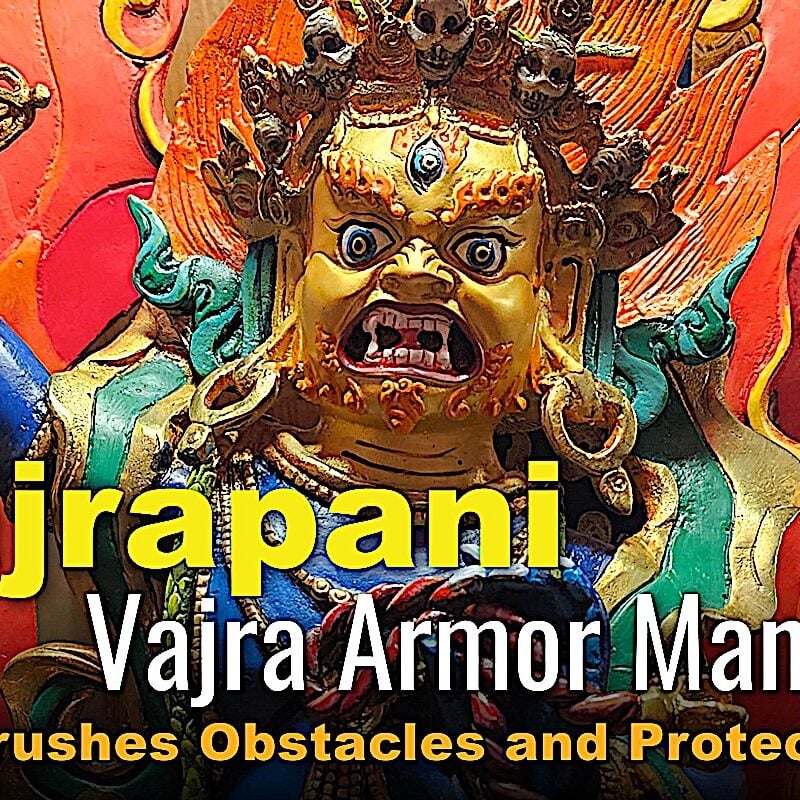
VIDEO: Vajrapani Vajra Armor Mantra: Supreme Protection of Dorje Godrab Vajrakavaca from Padmasambhava
Search
Latest Features
Please support the "Spread the Dharma" mission as one of our heroic Dharma Supporting Members, or with a one-time donation.
Please Help Support the “Spread the Dharma” Mission!

Be a part of the noble mission as a supporting member or a patron, or a volunteer contributor of content.
The power of Dharma to help sentient beings, in part, lies in ensuring access to Buddha’s precious Dharma — the mission of Buddha Weekly. We can’t do it without you!
A non-profit association since 2007, Buddha Weekly published many feature articles, videos, and, podcasts. Please consider supporting the mission to preserve and “Spread the Dharma." Your support as either a patron or a supporting member helps defray the high costs of producing quality Dharma content. Thank you! Learn more here, or become one of our super karma heroes on Patreon.
Lee Kane
Author | Buddha Weekly
Lee Kane is the editor of Buddha Weekly, since 2007. His main focuses as a writer are mindfulness techniques, meditation, Dharma and Sutra commentaries, Buddhist practices, international perspectives and traditions, Vajrayana, Mahayana, Zen. He also covers various events.
Lee also contributes as a writer to various other online magazines and blogs.






